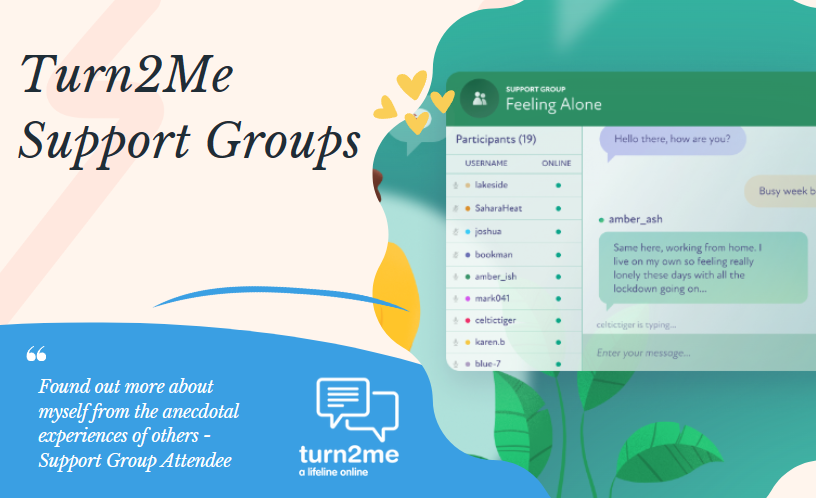Turn2Me offers free weekly support groups on a variety of topics alongside individual one – one counselling. This article is to assist our users gain an understanding of the benefits of group therapy and encourage them to register and avail of our weekly support groups. All our groups are anonymous, delivered online via instant messaging and facilitated by an experienced, qualified, and fully accredited therapist.
Group therapy is a collaborative therapeutic approach which brings individuals together who are facing challenges to explore and address their concerns in a supportive group setting. Through interactions with other members of the group, one can gain insight into their own patterns of behaviour and build effective coping strategies. Research has demonstrated the effectiveness of group therapy in treating several mental health issues (Yalom & Leszcz, 2005). Group therapy offers a dynamic and empowering approach to healing, personal growth, and transformation.
Strengths of Group Therapy:
Social Support and Universality: Group therapy assists members to recognize commonality amongst the group, this eases the sense of isolation and loneliness (Yalom, 1995). There can be a sense of universality and support throughout the members. It can foster a sense of community, belonging and understanding.
Diversity of Perspectives: Given the fact that members are part of a group it allows everyone to witness and exchange diverse perspectives and experiences (Yalom, 1995). This exposure is not available in one-to-one therapy and can enhance self-awareness, empathy, and personal growth.
Interpersonal Learning: This process allows members to gain insights into their own communication style, challenges, and relational dynamics. This assists with personal growth, awareness, and interpersonal skills. This can be an unsettling process for a member; however, the group holds and supports them throughout the process.
Catharsis and Emotional Expression: Group therapy facilitates catharsis by its very nature, allowing the open expression and processing of emotions in a supportive environment (Rutan & Stone, 2001). This therapeutic release assists with emotional healing.
Normalisation of Experiences: Group therapy illustrates that many challenges are shared and universal (Yalom, 1995). This normalisation reduces stigma and self-blame, encouraging a sense of acceptance and understanding amongst group members.
Group Cohesiveness: The growth of group cohesiveness enhances the therapeutic process (Yalom, 1995). A cohesive group is supportive and a safe place for its members to explore and share their thoughts and feelings.
Cost Effectiveness: Group therapy is more cost effective than individual therapy, which can be a big factor of consideration for members. This economic advantage increases accessibility to mental health support, which is of personal interest to me, increasing the reach of mental health supports to those that require it.
Difference between one-one counselling & Group Therapy
Individual therapy and group therapy are two distinct therapeutic modalities, each with its own advantages. Individual therapy focuses on the individual client, while group therapy shifts the focus to interactions among group members and facilitator, the group is a great source of support, feedback, and learning (Yalom, 1995). The therapeutic relationship in individual therapy is solely between client and therapist and provides a sense of clarity and trust. When in group therapy the therapeutic alliance extends to all members of the group, providing ideally a supportive community that assists the therapeutic process (Yalom, 1995). Group therapy is more cost effective as the facilitator’s time is shared among multiple members as opposed to one client, making it more appealing and accessible to potential group members. Group therapy offers an array of diverse perspectives, which in a successful group can lead to a rich therapeutic environment. Both modalities have unique strengths and are affective at treating various psychological issues.
In conclusion, group therapy can be a powerful and effective modality for addressing various psychological concerns alongside promoting personal growth within a supportive community. It offers its members the opportunity for self-discovery, emotional expression and interpersonal connection where individual therapy is unable. Its cost effectiveness and ability to reach diverse populations make it a valuable resource in mental health care. It empowers its members to cultivate resilience, develop coping skills, and enhance their overall well-being. Since the pandemic the world is recognising the importance of social support and collective healing, group therapy is the cornerstone of contemporary mental health treatment, offering transformative opportunities for growth, healing, and recovery. (Yalom & Leszcz, 2005)
Register now for one of our support groups at Turn2Me.ie a lifeline online.
- Mondays 6pm: Tips on how to manage your anxiety.
- Tuesdays 6pm: Tips on how to manage low moods.
- Wednesdays 1pm: All things relationships, romantic, platonic & family.
- Fridays 3pm: Support to process your grief.
- Monthly ADHD Support group.
References:
Yalom, I. D. (1995). The Theory and practice of group psychotherapy: Fourth Edition. Basic Books (AZ).
Rutan, J. S., & Stone, W. N. (2001). Psychodynamic group psychotherapy (3rd ed.). Guilford Press.
Corey, G. & Corey, M. et al. (2004). Group Techniques. Thomson Brooks Cole: UK
Yalom, I.D., & Leszcz, M. (2005). The theory and practice of group psychotherapy. Basic Books.
